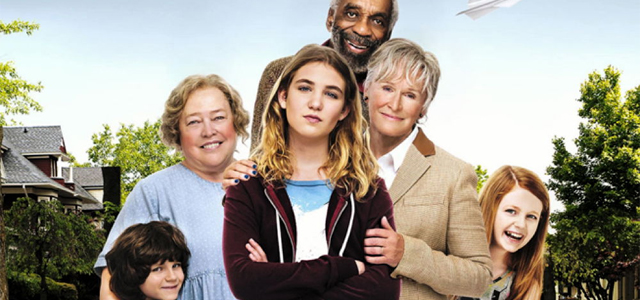(PG) Sophie Nélisse, Kathy Bates and Glen Close
Director Stephen Herek has taken the multi-award-winning book The Great Gilly Hopkins, written by Katherine Paterson (Bridge to Terabithia), and adapted it into a family-friendly tale of love and acceptance. Gilly (Sophie Nélisse) is not your average 11-year-old girl. For as long as she can remember, she has moved around the foster care system from one family to another. She is loud, brash, completely uncontrollable; bringing chaos wherever she goes. The film centres on Gilly’s last-ditch attempt to find a stable home and have a normal childhood. Her social worker, Ellis (Billy Magnussen) puts her with foster carer Maime Trotter (Kathy Bates) and her foster son W.E (Zachary Hernandez). Gilly, though, has different plans. She comes up with an idea to find her biological mother, Courtney (Julia Stiles), so she can be ‘saved’ from Maime Trotter. But Gilly’s usual tactics – surly attitude and disruptive behaviour – wash right off Ms Trotter. Instead of pushing the Trotters away, Gilly instead comes closer to finding a true family than anything she has previously known. That is, until her biological grandmother (Glenn Close) shows up and Gilly has to decide between the life she has and the life she has always wanted.
Unlike most family films (including Bridge to Terabithia), The Great Gilly Hopkins has a healthy dose of realism. Gilly struggles to deal with her mother’s abandonment, and acts out as an angry troublemaker. But she also longs for her mother’s return every waking second. I found this to be the most compelling and interesting part of the entire film, even though it still feels too simplistic (Gilly’s history and motivation isn’t explained in any satisfactory depth). Where Herek has the choice between truly showing the complexity of Gilly’s life or glossing over it with a simple one-liner, the latter is chosen. Also, Gilly’s character is very hard to empathise with (she has no redeeming qualities for the entire first half of the film).
Thankfully, the film has Kathy Bates, who is the absolute best pick for Gilly’s nurturing foster parent. Her wit and honesty remind me of her character in the Oscar-winning The Blind Side, where she tutors an adolescent boy with a similar story to Gilly. Bates’ quiet warmth allows the audience to engage with the film and (in some parts) even enjoy it. Similarly, Glenn Close, despite her limited part, brings grace and humility to a film that would have otherwise featured neither.
In trying to mix social realism with a children’s story, the plot struggles to keep the audience’s attention and the narrative doesn’t make a lot of sense. Unfortunately, director Stephen Herek has taken a highly successful book, and failed to inject it with the excitement required for the big screen. Instead, the film is slow and hum-drum, with a weak script and characters as two dimensional as the pages it was originally written on.
Looking Deeper
What does the Bible say about family? (Timothy 5:8)
What does the Bible say about helping others in need? (Romans 15:1)
Toya Gattas












